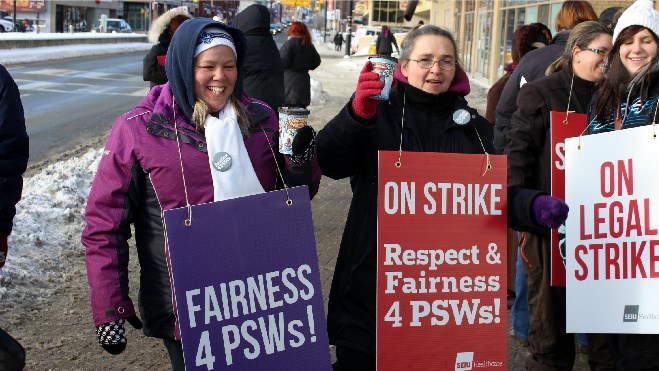The strike by 4,500 personal support workers in Ontario — including 50 Sudbury — has ended, according to a release from the union representing the workers.
“The strike is over — we’re moving to interest arbitration!” said Sharleen Stewart, president of the SEIU Healthcare union, on the group's website in a message posted Christmas Eve. “This means that as of Friday, Dec. 27, our strike is over and you can go back to work! Please contact your supervisors for your schedule or if you would like to go to work sooner.”
The workers, who went on strike Dec. 11, were demanding higher wages from their for-profit care provider, Red Cross Care Partners. The starting wage for a PSW with the company is $14.17 an hour. After 6,000 hours of work experience they reach $15.02 an hour, the highest wage within the company.
PSWs with the company are compensated for mileage at a rate of 34 cents per kilometre, but are not paid for the time it takes them to visit their clients.
On its website, Red Cross Care Partners said the mutually agreed upon arbitration process will begin in January.
“We recognize that this has been a challenging time for some of our clients and their families,” the company said. “Our clients’ safety and well-being has been our top priority and we are pleased that a resolution to the strike has been reached and that regular service for all of our clients will resume.”
“This is the most fair and neutral way to resolve a strike that could have gone on for much longer,” Stewart said on the union's website. “Usually interest arbitration is a step in the bargaining process reserved for essential service workers. Going through the process for our PSWs creates a strong argument to also give you the designation.”
Stewart wrote that even after a new contract is signed, they'll keep fighting to have PSWs in the same classification as police and firefighters, meaning contract disputes would automatically go to binding arbitration.
“We will continue to put pressure on decision-makers to deem you an essential service, and to fix our home-care system to ensure you get the fair treatment you and your clients deserve,” she said.
Join Sudbury.com+
- Messages
- Post a Listing
- Your Listings
- Your Profile
- Your Subscriptions
- Your Likes
- Your Business
- Support Local News
- Payment History
Sudbury.com+ members
Already a +member?
Not a +member?
Sign up for a Sudbury.com+ account for instant access to upcoming contests, local offers, auctions and so much more.
